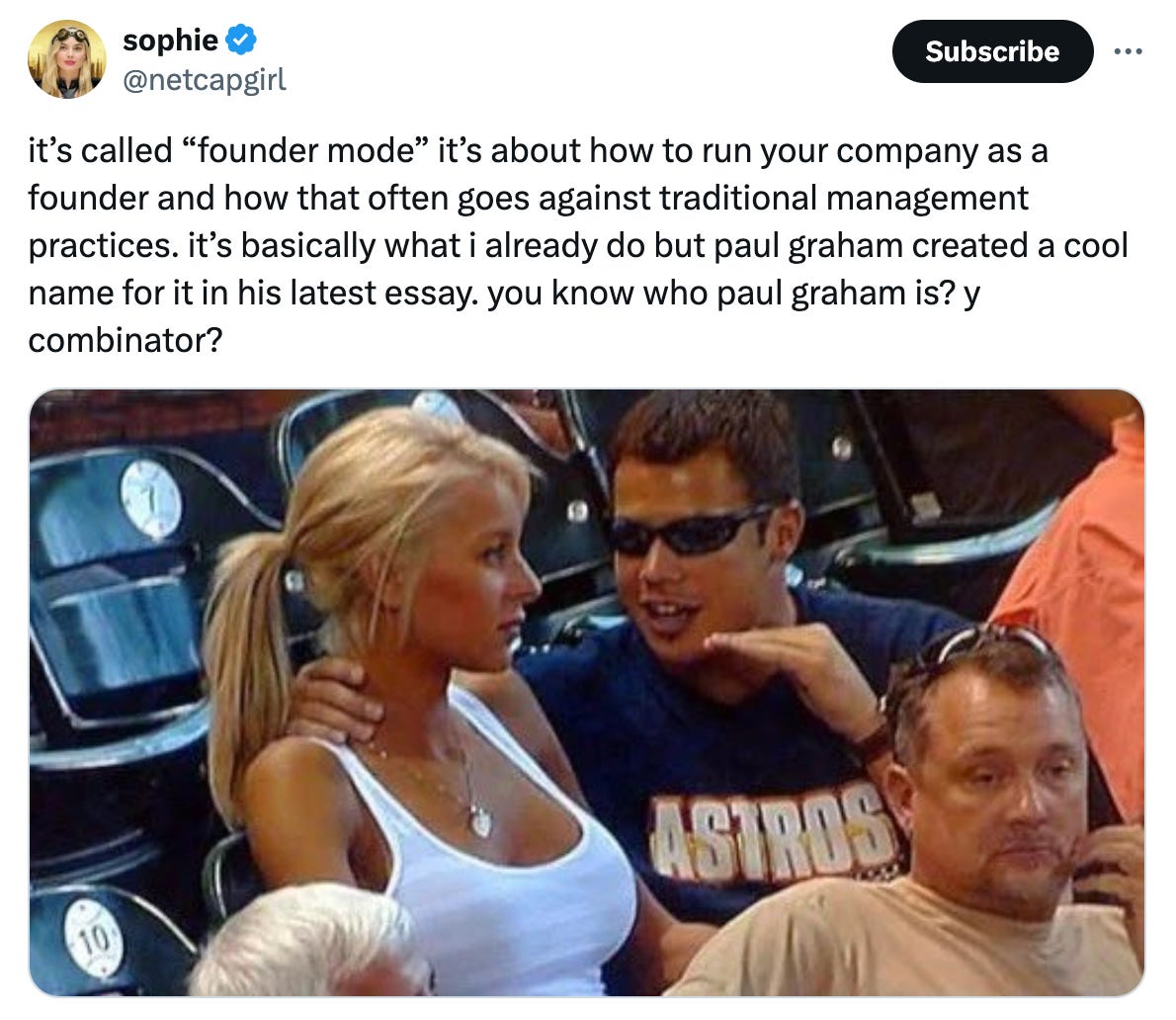Founder Fridays No. 108
Founder Mode Versus Manager Mode -- The Illusion of Control -- Sustainable Scaling
Happy Friday.
If you’ve been a reader for a while you may know how important ‘Essentialism: The Disciplined Pursuit of Less’ by Greg McKeown has been to me.
It’s the first book I read every year. This annual ritual has become my compass, steering me away from the common pitfall of overcommitment in my business and my life. Essentialism isn’t about cramming more into less time. It’s about getting only the right things done.
This philosophy challenges us to be more selective with our precious time and energy. It empowers us to take the reins of our choices, rather than passively allowing others to decide for us.
An Essentialist is a master of the strategic ‘no’, declining good opportunities to create space for the truly great ones. I’ve tried to bring an Essentialist mindset into my friendships, family life, and business, with transformative results. Any success I’ve achieved likely sprouts from these Essentialist roots.
Greg McKeown recently unveiled the 10th anniversary edition of ‘Essentialism’. Imagine my thrill to find myself mentioned in the introduction! Check out more on my instagram.
If you haven’t explored this book yet, I can’t recommend it enough. It has the power to reshape your life as it has mine.
On a somewhat related topic, today’s note focuses on competing versions of leadership for startup founders and operators. I’d be interested to hear which article most resonates with you and why. Click below to leave a comment.
Founder Mode Versus Manager Mode
Conventional wisdom on scaling startups might be fatally flawed. The standard advice of hiring skilled professionals and giving them autonomy often empowers expert manipulators who can drive companies into the ground. Successful founders report feeling gaslit from both sides — advisors pushing them toward hands-off management and employees exploiting this approach. Embracing a more-involved "founder mode" may be key to maintaining the innovation and agility that drove initial success, leveraging the founder's unique insights and vision to prevent disconnected teams from steering the company off course. Paul Graham (8 minutes)
The Illusion of Control
Modern CEOs are realizing that total control is impossible and often counterproductive. Instead of micromanaging, great leaders focus on what only they can do: setting priorities, asking thought-provoking questions and creating an environment where diverse talents can thrive. Rob Painter, CEO of Trimble, likens leadership to conducting an orchestra — you don't need to play every instrument, but you must harmonize the whole. This approach involves embracing individuality while fostering collective success, allowing for mistakes as learning opportunities and concentrating on high-impact areas. By relinquishing the illusion of control, leaders can empower their teams, drive innovation and navigate uncertainty more effectively in today's complex business landscape. Big Think (5 minutes)
Sustainable Scaling
As your startup grows, so does the stress. Successful founders like Nir Polak (Exabeam) and Snehal Antani (Horizon3.ai) emphasize the critical need for personal habits that support mental well-being and physical health. Key strategies include fiercely protecting personal time, establishing clear work-life boundaries and evolving leadership style from hands-on problem solver to strategic team leader. Building a strong, self-reinforcing company culture is crucial, as is learning to delegate effectively. Remember, your startup is an asset, not your entire identity. By implementing these practices, founders can navigate the transition from "zero to one" visionary to "one to N" CEO without sacrificing their personal lives or overall effectiveness. Signal Fire (5 minutes)
Founder FAQ: What’s the Difference Between Promising and Issuing Equity?
Understanding the difference between promising and issuing equity is crucial for startups. Promising equity is a commitment to future ownership, while issuing equity involves the actual transfer of ownership with complex legal and regulatory requirements. Equity promises can be made verbally, in offer letters or in agreements, but they don't constitute actual ownership. True equity issuance occurs only through specific legal documents like restricted stock grants or stock option grants. This distinction matters for employee ownership, company cap table accuracy and maintaining trust. Startups should be clear about issuance timing and details to avoid misunderstandings, as the gap between promise and issuance can be significant. Properly managed, equity can be a powerful tool for shaping company culture and motivating employees. Westaway (4 minutes)
Startup Funding Guides
I’ve put together a series of guides to equip founders to excel at fundraising. These guides break down the deal term by term and give you negotiation tips so that you can speak to investors with confidence.
Convertible Note: Guide / Video
Built By Founders for Founders
I co-founded my first startup with friends in 2007. As a founder, I struggled to find an affordable law firm that was designed for early-stage startups. So, I created one myself. Westaway is a law firm built by founders, for founders. If you're ready to ditch the outdated billable hour model and try a new approach to legal services that saves you time and money, let's talk. I'd love to jump on a 15-minute call to show you how we can make legal work smooth, fast and cost-effective for your startup. Schedule a call with me now.



